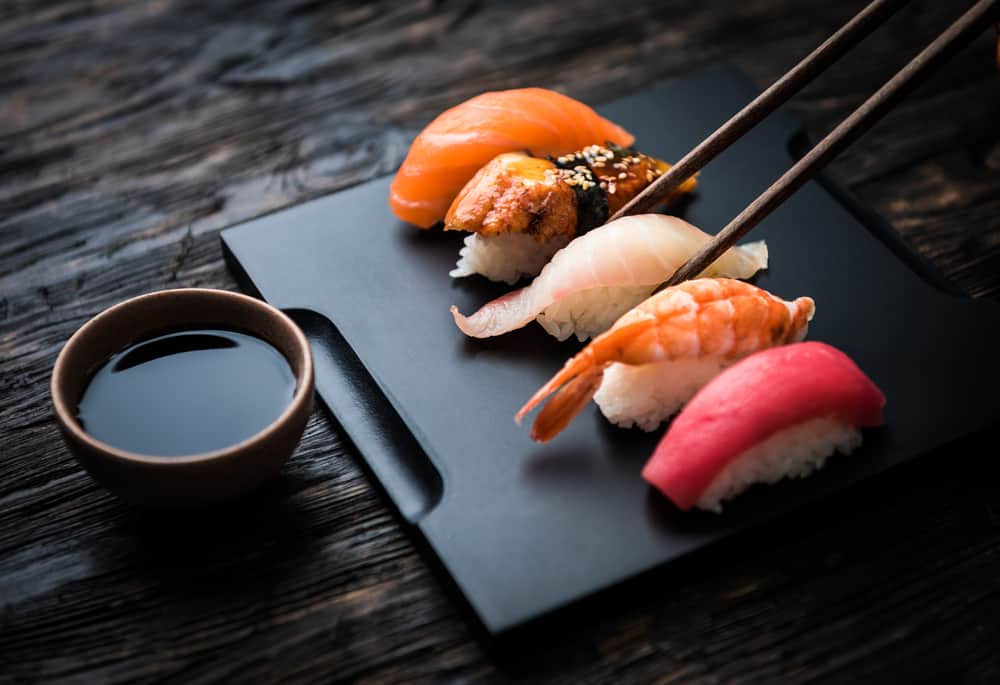Last Updated on 21st April 2022 by
Cooking meat thoroughly is an important part of making sure that you don’t experience food poisoning. No one wants to end up vomiting after a meal because the food isn’t cooked all the way through.
Meat is typically a very sensitive food, and if you don’t cook it like you should, you could become violently ill.
We have probably heard of some of the dangers of salmonella poisoning from eating raw chicken or other uncooked meats.
So, what’s the deal with raw fish? Why is sushi something that’s safe to eat, even though other meats are not?
What Is the Difference Between the Bacteria in Raw Fish and Raw Meat
The danger of eating any kind of raw meat, including fish, is bacteria. Bacteria loves living organisms, like meat, plants, and people.
Bacteria thrives on dead biological matter too, so it’s very common to find many different kinds of bacteria growing on meat. That’s why it’s so important to cook meat all the way through and to store it properly.
If meat isn’t kept cold and cooked at high temperatures, the bacteria will still be alive and thriving on the meat when you eat it. That bacteria in its living state will probably be dangerous to consume.
You can find bacteria on any kind of raw meat, and until that meat is cooked, the bacteria will still be there and will be spreading. Frozen meat, of course, provides some protection, as it freezes the bacterial growth and puts its expansion on pause.
There’s also bacteria on raw fish, but the good news is that it’s not as dangerous as the bacteria you can find on chicken or beef. You don’t find the same bacteria on raw fish as you do these other meats many times, and that makes it a lot safer to eat raw.
Are There Still Risks with Eating Raw Fish?
Yes, there are risks to eating raw fish. You can minimize your risk of bacterial infection and food poisoning from raw fish by making sure it comes from a clean kitchen and that has been frozen before use.
This helps keep the risk very low, though there may still be some bacteria on the fish.
The way food is stored determines what kind of bacteria can grow. If the food was previously frozen, that minimizes the risk considerably. If food is handled in a clean environment with sanitary hands and instruments, there’s little risk of bacterial growth.
If food is kept refrigerated rather than being allowed to sit out at room temperature, and it’s kept packaged too, all of that prevents bacterial growth as well.
If you’re minimizing your risks and being careful with raw fish, it should be safe to eat raw.
If you’re buying it from somewhere, make sure that it’s being stored in a safe, sanitary way. Most groceries and markets will use safe handling techniques to minimize the risk of bacterial growth, but it doesn’t hurt to ask about their techniques to make sure they have high standards.
What kind of bacteria might you expect to be on raw fish? Studies conducted within the United States showed that the bacteria vibrio, salmonella, listeria, and more were all found in samples of raw fish. These are just the harmful bacteria.
There’s plenty of other bacteria that’s not considered harmful that are probably hanging out on your raw fish too.
If you just noticed the word salmonella in that list and started to freak out a little bit, that’s understandable.
About 10% of all imported raw seafood into the US test positive for salmonella. For domestic raw fish, the number is much lower- 3%.
Yes, salmonella is dangerous, but for most people, it’s not going to hurt them if it is in small quantities. If you’re healthy, and there’s not a lot of salmonella bacteria on the raw fish, then it shouldn’t be a problem. You probably won’t even notice it and shouldn’t experience any symptoms of food poisoning.
Does Uncooked Fish Contain Higher Levels of Pollutants
It’s not just bacteria you have to worry about with the raw fish. Once fish has not been cooked, it can contain higher levels of pollutants than cooked fish.
If the fish has been sourced from a clean body of water that isn’t regularly polluted, then pollutants in the fish shouldn’t be a major issue.
If you don’t know where the raw fish comes from, it may be best to cook it just to be on the safe side.
Cooking fish helps to eliminate a lot of pollutants, killing germs and bacteria that could cause food poisoning or other health problems for you.
Is Raw Fish Actually Good for You?
You may be interested to know some of the health benefits of eating raw fish. Once you cook any kind of food, you’ll be killing not just bacteria and germs but also some nutrients and healthy components.
Raw fish contains some nutrients that are cooked out at high heat levels. So, there are some health benefits to eating raw fish that you don’t get with cooked fish.
Raw fish provides you with plenty of omega-3 fatty acids. Some of that gets cooked out when frying fish. These include docosahexaenoic acid and eicosatetraenoic acid, which you’ll find in smaller amounts and cooked fish.
There are some contaminants that form when frying fish, and this would include heterocyclic amines. These amines have slightly carcinogenic properties. If you consume a lot of them, you may be at higher risk for developing cancer.
So, there is some nutritional value loss when cooking raw fish. The longer you cook the fish for and the higher heat you use, the more of these nutrient levels will drop.
Of course, there’s plenty of nutritional value in eating cooked fish, but you should be aware of what you’re missing out on if you never have raw fish.
You get a lot of the same benefits from raw fish that you do in cooked fish, so you’re not losing benefits by eating it raw. This is why sushi is often considered s good part of a low fat, healthy diet.
It’s great for heart health, cholesterol, and other areas of overall physical health. If you eat a lot of fried fish, switching it out for raw fish can be very beneficial to you.
How to Keep the Risks of Eating Raw Fish Low
It’s safe to eat raw fish in most instances, but there are a few things you should do to minimize your risk of food poisoning or other health issues associated with uncooked meat.
First of all, buy your fish from a trusted source. Choose groceries and markets that are known for their quality and safe handling techniques.
If the source you want to use isn’t transparent about these things, then move on to find somewhere else to buy your raw fish.
When you bring fish home from the grocery market, make sure that it stays stored in the fridge or freezer to prevent and slow bacterial growth.
Always prepare raw fish on a clean surface. You can use antibacterial spray on countertops and other services that the raw fish will come into contact with.
If you take these precautions, you shouldn’t have to worry about cross contamination or food poisoning, and you can maximize the benefits from eating raw fish while keeping your risks to a minimum.
I'm Pauline, a mother of four grown children, my passion for cooking stemmed from the joy i get cooking for my family. I love to try new dishes, especially when dining out but creating and sharing my own recipes is my favourite thing to do!



partially nude
Friday 21st of February 2025
evHQOuv7s7E
mayonaise
Friday 21st of February 2025
x0c5uPmQHLF
Thng gii thiu binance
Saturday 30th of December 2023
I don't think the title of your article matches the content lol. Just kidding, mainly because I had some doubts after reading the article. https://accounts.binance.com/vi/register-person?ref=T7KCZASX